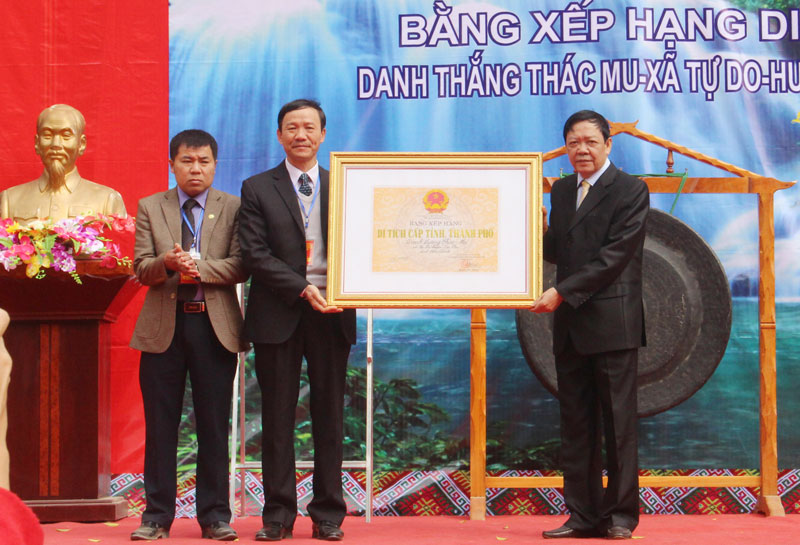
(HBO) - On November 23th, Lac Son District People’s Committee organized the ceremony of receiving the certificate of the province-ranked relics of Mu Waterfall in Tu Do commune (Lac Son).
Leaders of the Department of Culture, Sports and Tourism giving the Relics Certificate of Mu Waterfall to the leaders of Lac Son District People’s Committee and Tu Do Commune.
Mu Waterfall, which lies on Mu stream with the length of 2 kilometers and runs towards the North West - South East direction, belongs to Mu village, Tu Do commune and is far about 19 kilometers towards Southwest direction from the center of Lac Son district. The source of Mu stream originates from the high mountain, and then flows through Mu village, Khuong village, Sat village, Ry village in Tu Do commune, then through Thach Lam commune (Thach Thanh district – Thanh Hoa province) and into Buoi River. Mu waterfall has the height of 50 meters and the width of 30 meters, and it is divided into 6 floors with visible convexity and segmentation. Towards the bottom of Mu stream, the bed of the stream starts with a slope and is focused on from reclines. Moreover, from the height of 60 meters, large blocks of water fall down through several steps of white foam. The water runs through 6 floors of bending cliffs like a long hair. The bottom of Day Stream is one of the most famous falls in the province. Especially, Mu Waterfall is located in Ngoc Son – Ngo Luong Natural Reservation Area, which is considered as the unique National Natural Reservation Area, one important link in the complex of Natural Reservation from Cuc Phuong National Park to the border of Vietnam – Laos.
With the attractive wildlife, in recent years, Mu waterfall is a destination which attracts a lot of local and international tourists to visit and enjoy. From the beginning of this year until now, there have been more than 41,000 visitors, which have increased to 280% compared to the same period of 2016. The total revenue of all Mu waterfall services has reached over 2,5 billion VND, this has created stable jobs for over 100 local labors and contributed to promote the local economy, culture and society.
In order to protect and save the scenes, environment and promote community ecotourism, develop the traditional values of Muong ethnics, meet the needs of visiting resorts and community tourism, at the same time, create more stable jobs for local people, since 2017 March, Lac Son district People’s Committee has made a submission to the provincial People’s Committee for appraising and granting the certificate of Mu waterfall as the provincial relics. On September 29th, 2017, Chairman of Hoa Binh People’s Committee issued the Decision No. 1870/QĐ-UBND on the ranking of the province – level relics for Mu waterfall in Tu Do commune (Lac Son). The recognition and ranking of Mu waterfall relics have become the sources of cheering and encouraging the Party, the authority and ethnic people of Tu Do commune particularly and of Lac Son district in general to promote and exploit effectively the values of Mu waterfall, so that it can attract many more local and international visitors.
Located just a 20-minute drive from Hoa Binh City, Ora Hill Farmstay & Glamping Hoa Binh is a captivating new destination nestled in Mo hamlet, Bình Thanh commune, Cao Phong district. Combining farming with leisure, this tranquil retreat is perfect for those seeking balance, joy, and an immersive experience in the expansive beauty of nature.
Muong Bi - Tan Lac is renowned as one of the four famous Muong regions in Hoa Binh province. Blessed by nature with a favourable climate and stunning landscapes, Tan Lac holds great advantages for tourism development. The local tourism industry has made remarkable strides in recent times thanks to the attention and support from the local authorities and sectors.
With its strategic location, well-developed transport network, and diverse soil and climatic conditions, Hoa Binh is emerging as a must-visit destination in Vietnam's northwestern tourism corridor. The province boasts numerous attractions, including the Kim Boi hot springs (Kim Boi district), the Dau Rong cave complex (Cao Phong), the Mai Chau valley (Mai Chau), and the iconic Hoa Binh hydropower plant.
The northern mountainous province of Hoa Binh has been listed among the 71 most beautiful places to visit worldwide by the prestigious US travel magazine Condé Nast Traveller.
Hoa Binh province’s rich natural and cultural resources position it as a prime location for developing community-based tourism (CBT). In recent years, support from central and provincial policies, as well as assistance from non-governmental organisations, have encouraged local ethnic minority and mountainous communities to actively engage in the sector.



